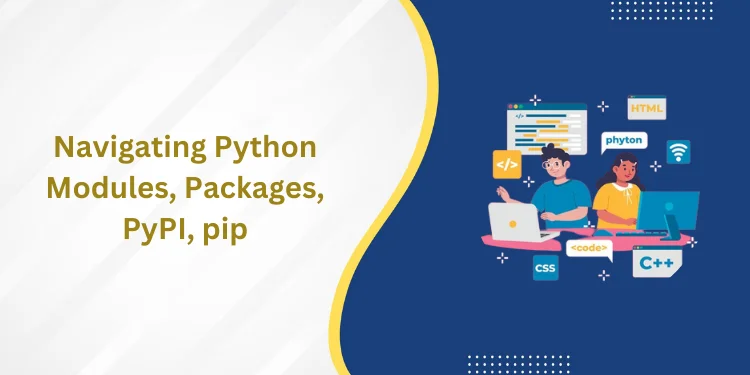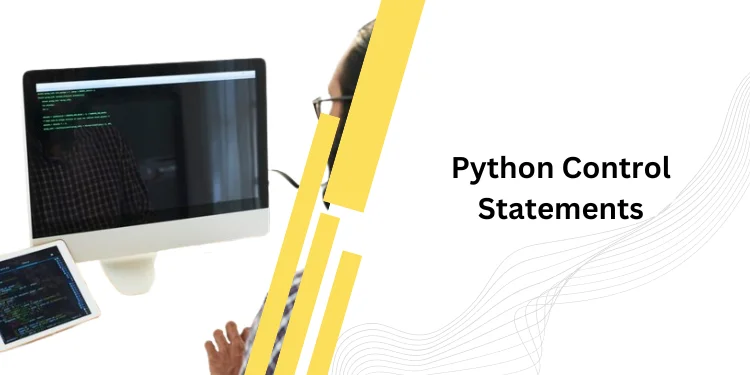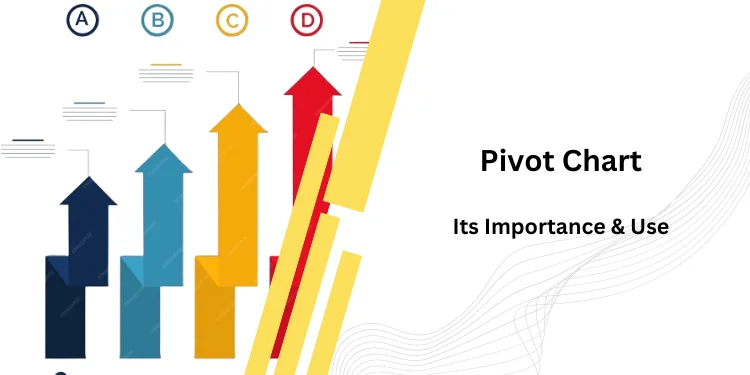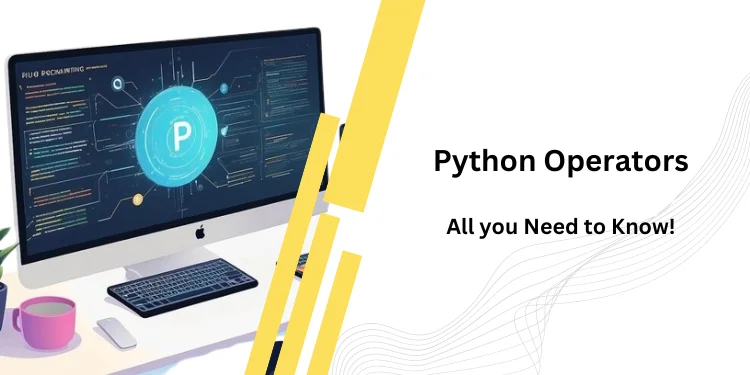Ever wondered what it takes to solve a complex problem or make a difficult decision? Do you know what is the basic need of the hour to be a great performer at work? How to develop critical thinking skills is regarded as one of the highly valuable skill sets in recent times. Say it at the workplace or even in our day-to-day lives.
Let’s understand this through an example:-
A new employee may encounter his boss putting pressure on him for some work with a deadline. He finds it difficult to relate and thinks to himself that he’s been treated unfairly. He tries to work hard and submit it before other new teammates. He notices that the boss wasn’t firm with them but was authoritative with him. As he slowly moves ahead with the work and understands the culture there, he witnesses that the boss behaves the same with his old and trusted colleagues.
This made him think critically about the scenario and to his realization, he could conclude that the boss had great expectations from him. He wanted him to excel and take over bigger responsibilities according to his potential.
So, what is it about this skill set that makes it so highly regarded? What are the benefits of critical thinking? Even though this list could be much longer, we believe the below mentioned are the most important.
Let’s get an overview of this topic (How to develop critical thinking skills)
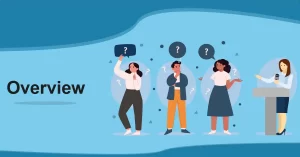
How to develop Critical thinking skills is a complicated concept that has evolved over the last 2,500 years. The word “critical thinking” can be traced back to the mid-late twentieth century.
How to develop Critical thinking skills is thought to have been documented for the first time in Socrates’ teachings, as recorded by Plato. However, the term has changed throughout time throughout history.
It is said to be an extremely complex idea that is best understood by philosophers and psychologists today. The following are some useful definitions of critical thinking in today’s world:-
- “Reasonable, reflective thinking which is focused on deciding what to believe or do.”
- “Deciding what’s true and what you should do.”
Each of us has a unique way of perceiving and understanding the problems, events, and circumstances in our lives. We assume that our perceptions are the foundations of our understanding of reality. It is, however, only half of the picture.
Our filtering systems, which interpret how to develop critical thinking skills and how we experience situations, events, and circumstances in our life as a result of the thoughts, beliefs, habitual behaviors, and emotions we create daily, form the foundation of our perception of reality.
What is Critical Thinking?
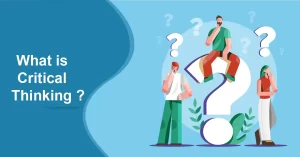
The ability to think in an organized and rational manner to understand connections between concepts and/or facts is known as critical thinking. It helps in the decision-making process. In other words, it’s “thinking about thinking”—finding, evaluating, and then fixing mistakes in our thinking processes and in the procedure of how to develop critical thinking skills.
Becoming a critical thinker takes time, practice, and patience.
Let’s go through these magical 7 steps of critical thinking to any situation you face, whether at work or in your daily life which can help you improve your critical thinking skills. There are also some critical thinking questions at each level to help you. we will help you how to develop critical thinking skills.
Process of how to Develop Critical Thinking skills
- Identify the issue or question.
Make your problem as specific as possible: the more specific the problem, the easier it is to discover solutions or answers.
- Gather information, perspectives, and arguments.
Look for a variety of sources that give different points ideas and points of view.
- Examine and assess the information.
Are the sources credible? Are these conclusions based on evidence or are they merely argumentative? Is there sufficient evidence or data to support my assumptions?
- Make a list of assumptions.
Are you sure and confident that the sources you discovered are not biased? Are you certain your search for solutions wasn’t skewed?
- Determine the importance of the situation.
What is the most crucial piece of information? Are all of your arguments and opinions relevant to the problem you’re trying to solve?
- Make a choice/conclude.
Decide which (if any) of the different conclusions that are possible are properly supported. Also, consider the benefits and drawbacks of every option.
- Make a presentation or communicate.
Present your findings to all participants once you’ve concluded.
What is the Importance of Critical Thinking?
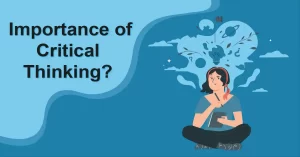
Facts and evidence are crucial, but understanding the source of the evidence and the link between facts is just as important. Critical thinking allows you to spot bias and manipulation and develop your well-informed judgments.
How to develop Critical thinking skills is an interesting question and this skill is a valuable soft skill in the workplace and school.
The Advantages of how to develop critical thinking skills include the following:-
- Question assumptions
- Make better decisions
- Exercise curiosity
- Create compelling arguments
- Reflect on yourself and your life
What does it include?
When it comes to how to develop critical thinking skills, there are a lot of key factors to consider. Familiarize yourself with these basic principles to improve your critical thinking skills:-
- Open-mindedness: Critical thinkers must aim for unbiased cognitive processes and be willing to consider multiple perspectives. This willingness to consider contradictory information is a prerequisite for critical thinking.
- Analyze information to determine its reliability and to have a thorough understanding of it so that further conclusions may be drawn. One of the most important parts of critical thinking.
- Interpretation: Take your time interpreting your findings, analyzing and understanding the meaning of relevant information.
- Situation-solving: You can come up with one or more possible solutions once you evaluate and interpret a problem.
- Decision-making: When you make an accurate decision, you reach a conclusion based on the information you’ve gathered.
- Effective communication: You must be successful in convincing people of your conclusions (as well as the mental actions th
at led to them). - Self-improvement: generally good critical thinkers develop positive mental habits by reflecting on and enhancing their own particular critical thinking process.
Examples and Quotes
Examples of how to develop critical thinking skills are all around us. Although this process appears to be extremely complicated, many of us carry it out without even realizing it. We might also highlight some more practical applications of how to develop critical thinking skills, such as:-
- Choosing whether an assignment’s research is accurate, valid, from a reliable source, and supports your point.
- Choosing which skills and experience to include in a job application or interview.
- Developing a strategy for achieving a goal based on a variety of aspects and variables.
Einstein modestly said, “It’s not that I’m so smart, it’s just that I stay with problems longer.” In a similar vein, he also said, “I have no special talents. I am only passionately curious. – Albert Einstein.
How to develop critical thinking skills/upgrade- Brief Explanation
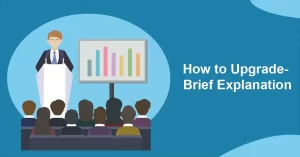
Know exactly what you want
The first step in critical thinking is to know exactly what you want. To solve challenges that satisfy their objectives, we must think critically. Every decision we make has a goal or purpose, and figuring out what that goal or purpose is, what we genuinely want out of it, provides us a place to start. So, ask yourself, “What am I looking for?” “What am I expecting to get out of this?”? You won’t know what the appropriate decision is until you know the answers to these questions.
Deal with your biases
When dealing with challenges, we frequently think just from our perspective. However, thinking from the perspective of someone else can help in how to develop critical thinking skills and decision-making.
Consider the consequences of your options
Making a list of advantages and disadvantages is a smart approach to start. You may make a far more informed decision if you ask yourself to consider every possible positive outcome as well as every possible negative outcome.
Do your research
You’ve probably heard that knowledge is power. Many of us, on the other hand, prefer to rely heavily on what we already know and are hesitant to abandon our ideas.
To address difficulties, critical thinking demands you to let go of your beliefs at times. Reluctance to study, research, or adapt new beliefs will simply hold you back and will have no bearing on your ability to think critically.
You’ll find that by doing your study and focusing on learning, you’ll change and adapt throughout time to overcome new challenges and increase your critical thinking.
Accept the fact that you’re not always right
Most of us, however, refuse to acknowledge this fact, which prevents us from thinking critically. If you’re doing something incorrectly and keep doing it because you’ve already convinced yourself that you can’t go wrong.
It’s time to make a change for your development. Always double-check solutions to problems, evaluate new possibilities, and learn from your mistakes.
Break it down
So, consider it in terms of steps: what is the first thing I need to do? Make a list and try to arrange it in order of importance or chronology. By breaking down a large problem into smaller chunks, you may begin seeking solutions rather than being overwhelmed by the problem for half of your time.
Don’t overcomplicate things
Critical thinking is a difficult skill. When it comes to how to develop critical thinking skills. It’s sometimes necessary to let go of old beliefs and experiment with new ones. It can be difficult at times, but if done correctly, it will be well worth it!
Which is the Best Critical Thinking Online course
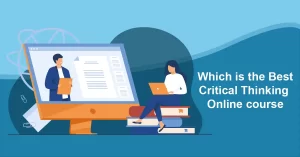
As a result, critical thinking is an important talent that can assist us in making better decisions and judgments. To be able to think critically and creatively, we must all overcome some thought obstacles.
Critical thinking will help you express your views, ideas, and opinions more clearly. Better communication allows others to better understand you, which reduces irritation for both parties. Critical thinking encourages creativity and creative thinking, which may be used in any aspect of your life.
Thankfully, as described in this post, there are a variety of options available to us. Our critical thinking course is an excellent place to start if you want to learn more about how to develop critical thinking skills. You’ll have a better understanding of how to develop critical thinking skills and think critically, Techniques of critical thinking, how to develop critical thinking skills and how to develop critical thinking skills and build and evaluate arguments. The course will give you a kick start in how to develop critical thinking skills.
Join us today at DataTrained to get mentorship in the field of Lifeskills courses from around 50+ Industry experts who will help you succeed and help you in improving critical thinking.
Conclusion
Now that you know, you can improve your critical thinking skills, you’re ready to get to work!
How to develop Critical thinking skills ultimate purpose is to solve issues or make decisions. This is accomplished by mentally analyzing information in a clear, logical, reasoned, and reflective manner t gain a better understanding of the situation.
You will develop your ability to recognize, analyze, and evaluate arguments made by others (including politicians, used car salesmen, and teachers), as well as to construct arguments of your own to convince others and to help in decision making. This specialization explains general principles of sound reasoning and provides tools to help you develop critical thinking skills. These abilities will assist you in determining when an argument is being presented, what its key components are, and what it implicitly (completely) assumes.
The first step in how to develop critical thinking skills is to define the problem. Consider the problem and break it down as much as you can to make it as specific as possible. Inquire about the scope of the problem. Determine why this issue exists and what will happen if no action is taken to address it.




